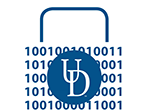Today is Data Privacy Day, an international day celebrated annually on January 28th to raise awareness about the importance of protecting personal information. Celebrate with us by learning about Delaware’s new privacy law, how to deal with the privacy challenges that arise from using Generative AI tools, why you should freeze your credit, how Crowdstrike protects our data at UD, and much more.

|
||
|
Not All Artificial Intelligence Models are Created Equally: Privacy Challenges for Users of Generative Artificial Intelligence
More and more products are building generative artificial intelligence (GenAI) tools into their offerings. GenAI includes any machine-based tool designed to consider user questions, prompts, and other inputs (such as text, images, and videos) and create new data or content based on existing information available to them. These tools may be publicly available, private, standalone, or offered as components of other software, and are being incorporated into products we use every day including our phones, computers, and cars. While GenAI tools can save time and help us answer complex questions, we must appreciate the privacy risk inherent with their use, especially the possibility of exposing sensitive, confidential information publicly. Know how to maintain your privacy while harnessing the power of GenAI.
Delaware’s New Privacy Law: What you need to know
The Delaware Personal Data Privacy Protection Act (“DPDPA”) went into effect in January. Passed in 2023 with much fanfare, the DPDPA requires those using personal information about Delaware consumers to be transparent regarding how and why they collect and use the information. Personal information includes any information that is linked or reasonably linkable to an individual who can be readily identified, directly or indirectly. The DPDPA also conveys rights to consumers in their personal information, such as the right to access it, correct it, or delete it, and it establishes timeframes for responding to these requests and for notifying consumers if a breach of their personal information occurs. Familiarize yourself with these data privacy guidelines and policies?
Keeping your social networks secure
Your social media use can affect your own security—and even the security of University data. Whether you’re an avid or occasional user, you should know social media best practices and how to spot common tactics of cybercriminals. Read more about Delaware’s new privacy law and how it affects you and the University.
University of Delaware Strengthens Cybersecurity Measures with CrowdStrike Falcon
The University of Delaware has introduced CrowdStrike Falcon, a cutting-edge Endpoint Detection and Response (EDR) solution, to enhance cybersecurity protections for university-owned laptops and desktops. This initiative is managed collaboratively by IT professionals within individual units and UD Information Technologies (UDIT), aiming to ensure a robust and secure computing environment across the institution. CrowdStrike is designed to prevent many cyber threats, including malware, ransomware, and other malicious activities. See how Crowdstrike works to monitor our systems, identify suspicious behavior, and safeguard UD-owned devices.
Important Update to NIH Genomic Data Sharing Policy
What could be more important than protecting the privacy of our biological code? Effective January 25, 2025, the National Institutes of Health (“NIH”) has issued NOT-OD-24-157 which implements heightened security requirements for controlled-access human genomic data, a form of highly sensitive information that can reveal a person’s predisposition to certain health conditions, ancestry, and other personal details. Learn more at the FTC's website.
Freezing Your Credit to Protect Yourself As we described in this Secure UD News article from August 2024, it’s likely that “the bad guys” already have access to some of your personal information, including financial identifiers such as your Social Security Number (SSN), bank account numbers, credit card numbers, and date of birth. The result? Criminals can attempt to assume your identity using some combination of those identifiers, and then, pretending to be you, they might open credit cards or apply for bank loans in your name. And, if not caught quickly, you can find yourself in massive debt without having spent a dime Learn how to put up a roadblock to protect your credit.

|
QUESTIONS ABOUT THIS EMAIL?
https://www.udel.edu/security |
